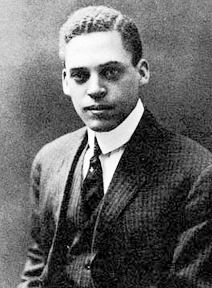Ernest Just
Ernest Everett Just (born August 14, 1883 in Charleston , South Carolina , † October 27, 1941 ) was an American biologist of African American descent. Just advocated studying cells under normal conditions instead of in the laboratory. His most important work dealt with the surface of the egg cell .
Live and act
Childhood and youth
Just was born in Charleston, South Carolina in 1883 to Charles Frazier Just Jr. and Mary Matthews Just. His father and grandfather were dock workers. When he was four they both died within a year. After that, the mother had to get through Just and his two siblings alone. At the age of 13, Just made the decision to become a teacher. His mother sent him to boarding school in Orangeburg , South Carolina. Because the schools for blacks in the south weren't good, he went north when he was 16. There he attended the Kimball Union Academy College Preparatory School. He completed the four-year program in just three years and graduated from school as the best of his year.
He then went to Dartmouth College in Hanover , New Hampshire . In 1907 he completed his studies with "magna cum laude".
Career
After graduating, he began teaching at Howard University in Washington, DC . In 1912 he became chairman of the Department of Zoology. He stayed that way until his death. He met Frank Rattray Lillie , who invited him to the Marine Biology Lab in Woods Hole, Massachusetts. From then on, Just spent some time there every summer. In 1915 he received the Spingarn Medal from the National Association for the Advancement of Colored People (NAACP). In 1916 Just got his doctorate for his work on fertilization . In the years that followed, Just gained international recognition for his work on fertilization. His book Basic Methods for Experiments on Eggs of Marine Mammals received widespread recognition in the scientific community. Because Just in America suffered from racist prejudice, he emigrated to Europe in 1929. At the end of January 1929, accompanied by his 15-year-old daughter, he arrived at the zoological research station in Naples , where he was a visiting professor. There he met Margret Boveri , who was employed here as a secretary. A relationship developed between the two that lasted even after Just's time in Naples, when he moved to the Kaiser Wilhelm Institute for Biology in Berlin-Dahlem on January 11, 1930 after his temporary return to the USA . The relationship only ended when Just met his future wife Hedwig Schnetzler in the summer of 1931. After the Nazis came to power, the family fled to France . After the German invasion he was briefly in a prison camp. However, his family was ransomed by the Americans. He died of cancer on October 27, 1941 .
Private
In 1911 he founded the Omega Psi Phi student union with his friends Edgar Amos Love, Oscar James Cooper and Frank Coleman .
literature
- James Kessler, JS Kidd, Renee Kidd, Katherine A. Morin: Distinguished African-American Scientists of the 20th Century . Oryx Press, Phoenix (Arizona) 1996
- Patrick McKissack, Frederick McKissack: African-American Scientists . The Millbrook Press, Brookfield (Connecticut) 1994.
- Kenneth R. Manning: Black Apollo of Science. The Life of Ernest Everett Just . Oxford University Press, New York (New York) 1983
- Lisa Yount: Black Scientists . Facts on File, New York 1991
Web links
| personal data | |
|---|---|
| SURNAME | Just, Ernest |
| ALTERNATIVE NAMES | Just, Ernest Everett |
| BRIEF DESCRIPTION | American biologist |
| DATE OF BIRTH | August 14, 1883 |
| PLACE OF BIRTH | Charleston, South Carolina |
| DATE OF DEATH | October 27, 1941 |
